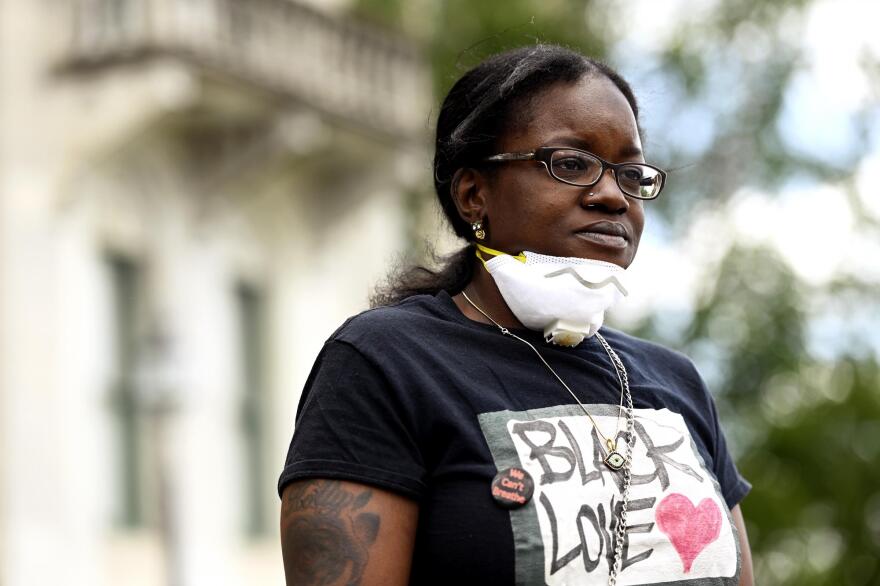It’s been more than four months since Breonna Taylor was shot and killed in her home by Louisville Metro Police as they executed a no-knock search warrant. She was a 26-year-old Black woman who worked as an emergency medical technician and aspired to become a nurse.
And while rallies, protests and much of the media attention has been fixed on the killing of George Floyd in Minneapolis, Connecticut activists continue to bring attention to violence committed against Black women and girls through policing and from systemic racism.
“A lot of these things trigger me,” Holly Tucker, a mother from New Haven, said at a rally last month. “I try not to come as much as I used to, more so because I was pulled out of my car three years ago by the police and I’m still in my healing process. But I also still want to be supportive of everyone else. It’s not only just about me, you know, because it’s happening to all of us.”
National reports show that the lifetime risk of being killed by police is highest for Black men, and their deaths have sparked actions in Connecticut and across the country that call for justice and an end to systemic racism.
Black women and girls, including trans women, have also suffered harm or died at the hands of police during attempted stops, arrests, raids and other interactions. But their cases often fade from the forefront in discussions on police reform and racism, even as incidents contribute to a lower life expectancy for Black women than for their white and Hispanic counterparts.
Public health and justice experts said people need to recognize that for what it is -- a health issue.
“Black women tend to be the pillars and the ones that take the hits and the ones that show up and defend and the ones that clean up the mess afterwards and all of that,” said Claudine Fox, campaign manager for the ACLU of Connecticut.
“And so there is inherently this undercurrent in our society that just expects Black women to continue to take it. It’s very easy for Black women to unfortunately fall by the wayside when harm is committed against us as well.”
It’s well documented that Black women already suffer adverse health outcomes. In Connecticut, they are three times more likely to die during pregnancy and childbirth than white women. Nationally, they have one of the highest homicide victim rates as a racial group, and they experience a disproportionate burden of cardiovascular disease and cancer.
This can all be compounded by how they are policed, Fox said, which ultimately damages the health and well-being of Black women.
“Just the simple existence of being a Black woman engaging with systems that were not built for us can inherently create a stressful environment. And so your blood pressure goes up, cholesterol goes up, diabetes can be a thing, heart disease can be a thing,” she said.
“All of these things can happen just because of the general everyday trauma in existence of moving through racist systems in our world, especially with engagements of police.”

Tucker said she knows that trauma all too well. She sued New Haven Police several years ago for police brutality during what she calls a false arrest after a traffic stop. Her charges were nolled and her suit was eventually settled.
“Three years of this and I’m thinking, you know, I’ll be fine. And I’m still emotional at times,” she said.
The federal government and many states lack comprehensive data on the policing of women by race and ethnicity, especially in tracking incidents over long periods of time. Fox said Connecticut is no different.
“We’re still not looking at the everyday engagements that Black and brown folks go through with police,” she said. “In terms of harm, sexual misconduct is the second-most reported harm at the hands of police, and it’s not something that’s captured on video by a bystander.”
Organizations like the African American Policy Forum and the #SayHerName campaign have stepped in to document and bring awareness to policing harms against Black women and girls.
Connecticut does track traffic stops. Data from the CT Data Collaborative showed that Black non-Hispanic women accounted for nearly 6% of all stops in 2018, which is slightly higher than the percentage of all Black women in the state (5.6%), according to population estimates by the state Department of Public Health.
The percentages of stops that represented white non-Hispanic women and Hispanic women, by contrast, were noticeably lower than their respective population rates.
Amani Allen said the trauma and stress from directly or indirectly experiencing acts of racism can have short- and long-term impacts on Black women and their health.
Allen is executive dean of the Divisions of Community Health, Sciences and Epidemiology at the University of California, Berkeley. She was an expert panelist for a virtual event last month hosted by the Health Disparities Institute at UConn Health.
“I’ve talked to lots of women that talk about their tremendous concern for their sons and for their spouses and partners,” she said, “and all of that adds to the burden of stress that women bear, increasing their biological and all other kinds of susceptibility -- mental, physical, etc.”
Whether it’s related to police violence, the COVID-19 pandemic or other areas that contain disparities for Black people, Allen said action needs to be taken with Black women and girls in mind.
“We need to be asking that question about, how is racism operating here, really questioning all of our policies and being intentional with our policymakers, our legislators to really put Black women in the narrative so that we’re not an afterthought,” she said.
Several investigations into Breonna Taylor’s death are ongoing. Police officers involved in her death have been fired or placed on leave, but no arrests have been made.







